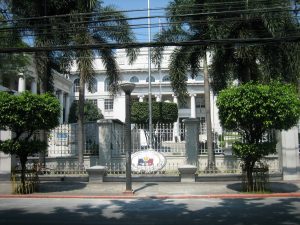The Philippine House of Representatives has challenged a recent Supreme Court ruling nullifying its impeachment of Vice President Sara Duterte, filing a Motion for Reconsideration urging the court to reverse its ruling.
Duterte was impeached by the House of Representatives in February for “violation of the constitution, betrayal of public trust, graft and corruption, and other high crimes.” These include alleged corruption, involvement in extrajudicial killings, and a threat to assassinate President Ferdinand Marcos Jr.
However, in a unanimous ruling on July 25, the Supreme Court said that the impeachment had violated a constitutional rule known as the “one-year bar,” which states that only one impeachment proceeding may be initiated against any official within one year.
In its motion to the Court, which was filed on Monday, lawyers for the House argued that impeachment “is primarily a political process, as emphasized by the Constitution’s entrusting it to Congress and not to the Judiciary.” It added, “Thus, any ruling of this Honorable Court on impeachment must reflect impeachment’s true nature. It must give due deference to the branch of government to whom impeachment is entrusted.”
The Supreme Court argued that the House violated the one-year bar by accepting and archiving three prior impeachment complaints, and that the fourth should have been barred. But the House motion claimed that this was the result of a factual error, and “it is rather the fourth impeachment complaint which barred all other impeachment complaints from being initiated.”
In a video statement on Monday, House Speaker Martin Romualdez, a cousin of President Marcos, said that the motion was “an exercise in constitutional stewardship – an affirmation that every branch must act with fidelity to the Charter that gives us all our power.” He added, “We act not to provoke a clash of institutions, but to prevent the erosion of the people’s right to accountability.”
Duterte, the daughter of former President Rodrigo Duterte, has denied the charges laid out in the articles of impeachment and described it as a politically motivated witch hunt. In response, her allies have made a number of legal attempts to block to advance of the impeachment, including a resolution in the Senate and several complaints to the Supreme Court.
The impeachment drama grew out of the bitter ongoing feud between Duterte and Marcos. Their two political families formed a formidable partnership ahead of the presidential election of 2022, and Duterte and Marcos won their respective elections in a landslide. But the partnership between the two camps has since deteriorated, due to a toxic combination of political differences and personal idiosyncrasies.
In June 2024, Duterte resigned from Marcos’ cabinet, where she served as education secretary, and immediately came under investigation for her alleged misuse of government funds. This provided the backdrop to her outburst during a livestream in November, during which she claimed that her life was at risk, and that she had had hired a hitman to assassinate the president, his wife, and House Speaker Romualdez, in the event of her own murder. The month after Duterte’s impeachment, her father was arrested by Philippine police on an arrest warrant issued by International Criminal Court in The Hague. Duterte is now in the court’s custody awaiting trial for crimes against humanity linked to his violent “war on drugs” campaign.
While the Supreme Court said that it had not absolved Duterte of the charges, its ruling offered a last-minute reprieve for Duterte, who was awaiting a Senate trial that could have stripped her of the vice presidency and disqualified her from public office for life. The vice president is widely expected to launch a campaign for the presidency in 2028, in a bid to succeed Marcos, who is limited to a single six-year term in office. If successful, she will no doubt use the powers of her office to pursue retribution against the Marcoses and their allies.
If the Supreme Court ruling stands, its net effect may simply be to ensure that the Duterte-Marcos feud continues to dominate Philippine politics up to, and maybe beyond, the next presidential election.

































